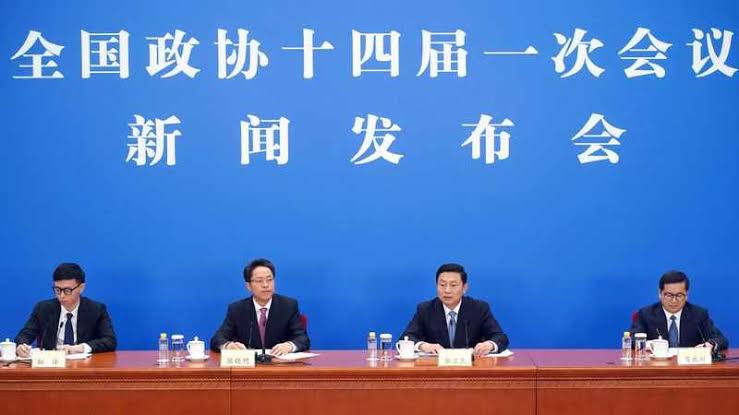Guo Weimin (R2) attends a press conference at the Great Hall of the People in Beijing, capital of China, March 3, 2023. /Xinhua
A key event in China’s political calendar, the annual sessions of China’s national legislature and top political advisory body, known as the Two Sessions, is of special relevance this year. 2023 marks the first year for China to fully implement the guiding principles of the 20th National Congress of the Communist Party of China (CPC).
Promoting steady economic growth and advancing opening up were highlighted by Guo Weimin, spokesperson for the first session of the 14th National Committee of the Chinese People’s Political Consultative Conference (CPPCC), at Friday’s press conference held by the National Committee of the CPPCC, the country’s top political advisory body, ahead of its annual session.
The first session of the 14th National Committee of the CPPCC is scheduled to start on Saturday at 3:00 p.m. in the Great Hall of the People in Beijing and conclude on March 11 in the afternoon, lasting seven and a half days.
Promoting steady economic growth
China’s national political advisors believe that the country’s economy remains resilient and is full of potential and vigor, said Guo, adding that in 2023, top priority should be given to promoting steady economic growth and achieve “effective improvement in quality and reasonable growth in quantity”.
China’s economy expanded 3 percent last year, overcoming the impact of factors beyond expectations such as a complicated global environment, COVID-19 and natural disasters, according to Guo.
The spokesperson mentioned that China’s continued economic recovery will provide solid support in stabilizing employment.
With the optimization and adjustment of epidemic prevention policies and further implementation of various measures to stabilize the economy, the Chinese economy will continue to recover and provide solid support in stabilizing employment, he said.
China’s private economy will embrace new opportunities for development and the stage for private enterprises will be broader as the country’s economy is expected to pick up on the whole in 2023, he added.
Highlighting the significance of the digital economy in promoting the development of the national economy, Guo said that China needs to consolidate the foundation of the development of digital economy and boost the integration of digital economy and manufacturing.
The CPPCC members have made several proposals regarding the country’s economic recovery, like deepening the reform of China’s financial system and also guiding financial institutions to better serve small firms, innovation and development, said Guo.
Advancing opening up
China will take concrete measures to promote opening up and continue to provide new opportunities and drivers for global development, said Guo.
China’s faith in and its commitment to reform and opening-up will not waver, he said, adding the CPPCC has actively conducted its work around the strategic policy.
“China will take concrete measures to promote opening up and continue to provide new opportunities and drivers for global development,” he told reporters.
The spokesperson stressed that the Belt and Road Initiative (BRI) has facilitated economic growth and improved people’s livelihood along the routes.
BRI construction has also brought effective investment and more quality assets to participant countries, he said.
Work of the CPPCC
The CPPCC is an important organization of multi-party cooperation and political consultation under the leadership of the CPC, and gives full play to the important role of a special consultative body in the country’s governance system, Guo said.
Over the past five years, the National Committee of the CPPCC made suggestions on promoting high-quality development and the formulation and implementation of the 14th Five-Year Plan, he said.
In recent years, the CPPCC National Committee has made good progress in various fields, such as establishing an evaluation system for participation in and deliberation of state affairs, establishing a long-term mechanism for democratic supervision, and improving the quality and effectiveness of proposals, he added.


